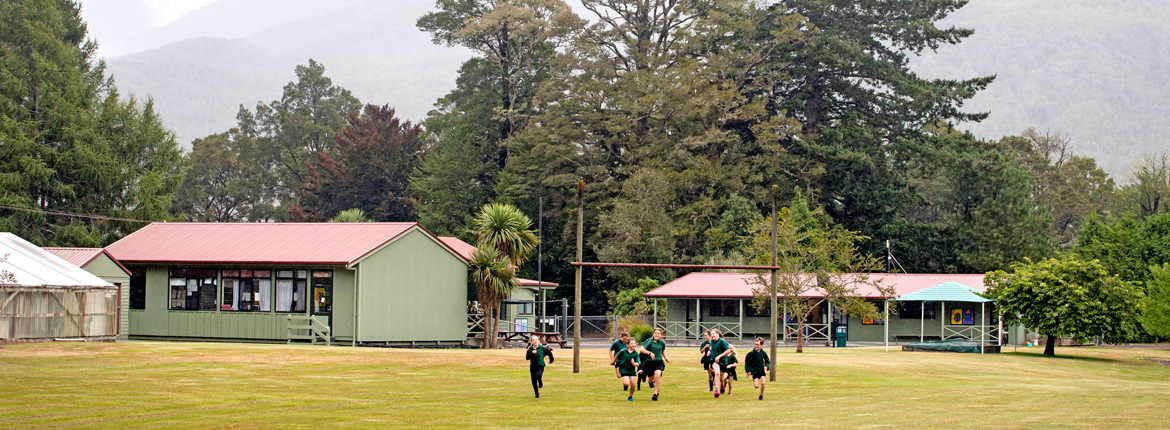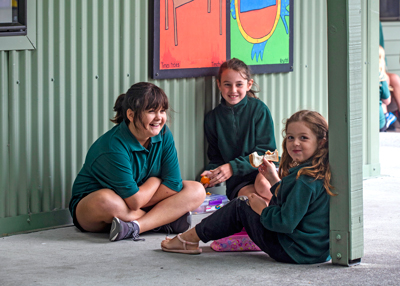
A hub for all
Not just for school children
Maruia School’s heart beats to the pulse and rhythm of rural life. Set in dairy farming Buller, the programme for its 15 students runs with the cycles of the agricultural community.
The roll alone is significantly influenced by Gypsy Day, June 1, which represents the industry’s annual contract changes and sees many families moving between farms.
At this time the school – which has two modern, well-resourced classrooms and caters for Years One to Eight – plays an invaluable role in helping the community gel through its annual Welcome Dinner.
Organised by the Parent Teacher Association – headed by mum Vicki, who is also a relief teacher – it allows locals to gather, with friendships forged and reinforced.
“We’re one big family here and look after each other, which attracts me to working in a community like this,” says Principal since 2011 Peter King, who as well as nearly 40 years’ teaching experience, empathises with rural life, having grown up on a dairy farm.
Any sporting or cultural activities requiring additional parent help with transport are concentrated where possible into the months before calving and weaning. Connections with the closest schools in Reefton and Murchison – around 65km away – enable the children to socialise with others and benefit from larger schools’ resources.
The school continues to be the lifeblood of the community year-round. At Christmas, its spacious grounds, surrounded by stunning mountains and flanked by dense native bush, host an annual gathering, and during those warmer months the covered swimming pool provides a handy meeting place, even for guests of the local motels. What’s more, its library is a community facility, and the school’s weekly newsletter enables groups like the Rural Women’s network to advertise.
Despite the picturesque location, finding staff is a challenge, so Peter – who commutes the 200km weekly from his home in Nelson – relies on parents’ support. The caretaker, teacher aide and cleaner are all mothers of students; office administrator Ann, whose five children and grandchildren have been pupils, is retiring after 44 years (she’s also been teacher aide, cleaner and bus driver), and her husband Derrick is the current bus driver. Peter also remembers days when, despite being the school’s only full-time teacher, he’s worn every hat himself.

To help avoid this, and provide the best learning opportunities for students, a contribution from the Ministry of Education is boosted by the community to the tune of $30,000 to cover the cost of a second qualified teacher’s input four days a week. Fundraisers include a calf scheme – whereby proceeds of the animal’s sale are donated – and trail bike rides organised on farms willing to open up their land.
In such an isolated location, the Board of Trustees has struggled to find additional permanent teachers. To accommodate one in the past, the community rallied to provide a dwelling, furnishings, manchester, washing machine, and even a car. More recently, a newly qualified teacher joined at the start of the year. She has been hugely impressed by the cheerful, welcoming pupils who’ve helped her settle in – with an annual student turnover as high as 66% the kids have become excellent mentors for new arrivals.
“All schools have challenges but when you load those against the geographical and social isolation it’s extra difficult,” Peter says. “Even accessing health support means kids being away a whole day. But you balance that with huge positives and the kids are very enthusiastic about the benefits of living here.
How many schools have an environment like this and a community like ours? The kids make huts in the native bush, there’s a wilderness trail, and we enjoy our rural environment for the learning opportunities it presents.
“Having such a range of ages means we’re effectively running 15 different learning programmes, but that gives opportunities for leadership roles and the kids are amazing in the way they support that.
This is a special place, with a nurturing whānau environment. Having that closer relationship with the children and their families is really valuable – the more you know about what makes them tick, the easier it is to support their learning.”
Reported by Fiona Terry for our AA Directions Autumn 2020 issue
